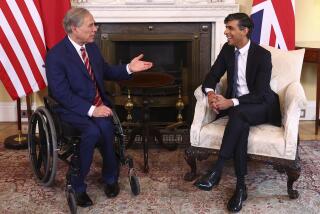Telecom’s Potential Shines in WTO Pact
- Share via
WASHINGTON — The global agreement reached Saturday to liberalize trade in telecommunications demonstrates with bell-ringing clarity the technology’s potential to reach out beyond national borders.
The giants of the U.S. telecommunications industry--AT&T;, MCI and Sprint--were gushing in their predictions: The pact will allow them to spread American technological prowess and profits around the globe. A talkaholic in Tarzana will be able to telephone Tanzania at sharply reduced rates.
But dangers lurk. Gary Hufbauer, a senior fellow at the Institute for International Economics, suggests that U.S. tax consultants could suddenly face competition from, say, Pakistan, where accountants could take advantage of high-quality data-transmission lines to prepare tax returns for small businesses halfway round the globe.
On the positive side, educational opportunities could open up, giving schoolchildren in developing nations Internet access to documents in U.S. libraries’ computers. Retail customers in the United States could circumvent local stores and wholesalers and order directly from warehouses or factories in low-wage, less-developed nations.
And on a much broader plane, the success achieved by the 70 participating nations demonstrates for the first time on such a grand scale the trade-expanding possibilities of the World Trade Organization, as nations whose economies have been built around state-run monopolies commit themselves to free-market competition.
Even as the telecommunications industry has grown from the telegraph to the Internet, from copper wires to direct satellite transmissions, it has remained one of the world’s most nationalistic industries.
“To turn it, over a decade, into an industry which is competitive, with free entry by outside forces, will be a dramatic change,” Hufbauer said.
That is exactly what the pact will do when it begins taking effect next Jan. 1. It will allow foreign companies to compete in providing international telephone services, cellular phone service and access to satellites.
Where Belgacom has had a monopoly in providing Belgium’s telephone service, for example, communications firms based in the United States and elsewhere would be allowed to compete for business or invest in the local company.
And where local regulations may have kept those companies out of Indonesia, Thailand or other countries where geography or topography made installation of telephone lines difficult or impossibly expensive, there are predictions that phone companies will leapfrog the land-line stage and move directly to establishing cellular phone systems built around ground stations that relay signals to satellites.
It is such an exciting prospect, said Harris Miller, president of the Information Technology Assn., that he showed up at a news conference in a tuxedo and multihued bow tie and cummerbund to celebrate.
For Charlene Barshefsky, the acting U.S. trade representative while she awaits Senate action on her nomination, Saturday’s agreement in Geneva demonstrates that the WTO can negotiate major a liberalization in trade rules and tear down protectionist barriers sector by sector. It need not wait for a multiyear, multi-sector round of trade talks of the sort that established the WTO two years ago.
“This is a critical point,” she said in an interview. “To the extent countries don’t open up their markets waiting for a new round, the United States ends up in the disadvantage,” because its markets are generally more accessible than others around the world.
More to Read
Inside the business of entertainment
The Wide Shot brings you news, analysis and insights on everything from streaming wars to production — and what it all means for the future.
You may occasionally receive promotional content from the Los Angeles Times.










